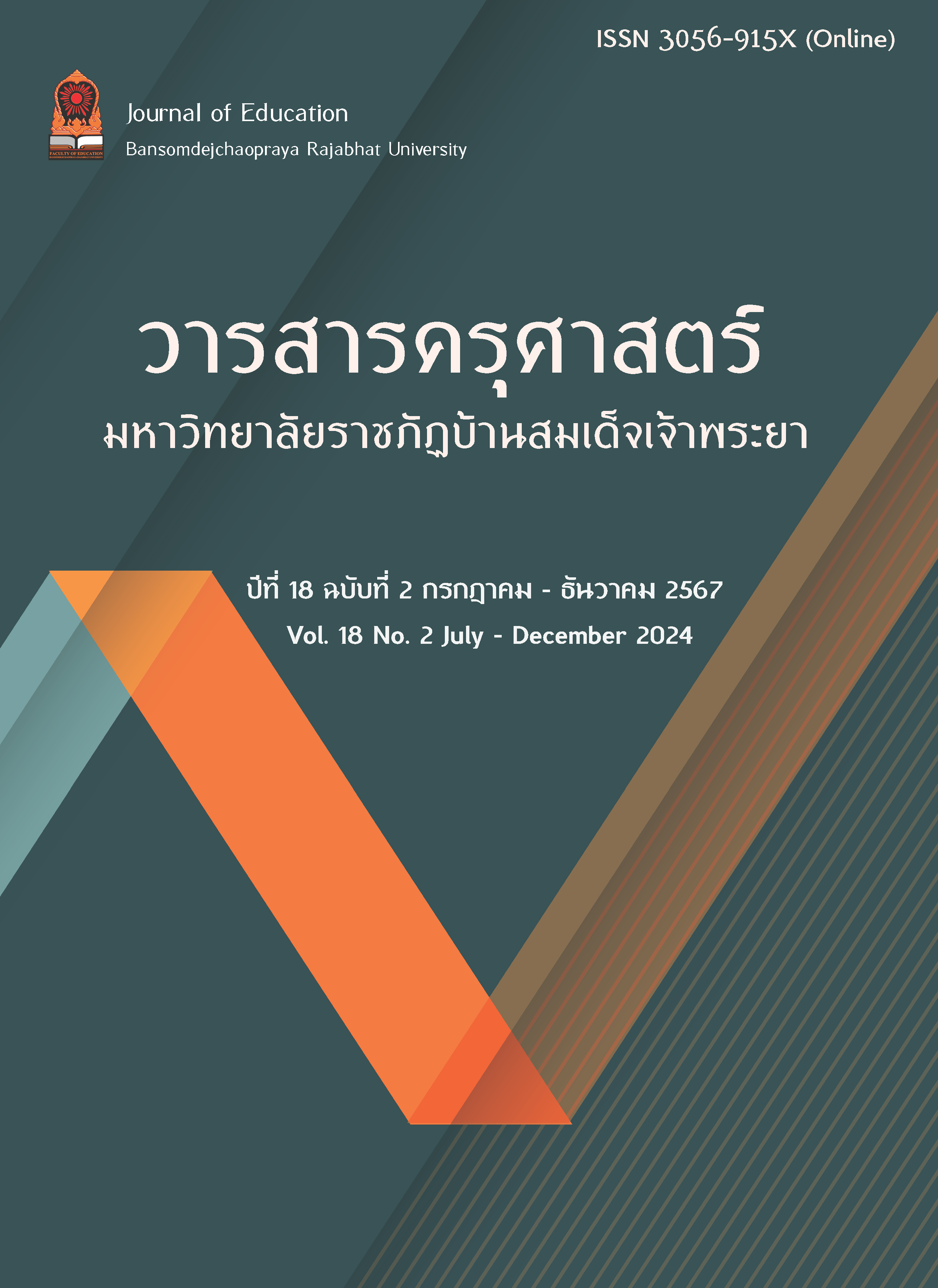Learning management to develop social skills in early childhood
Keywords:
Social skills, Early childhood, Learning managementAbstract
The development of social skills in early childhood is crucial for future success in both academic and personal life. Early acquisition of these skills enables children to adapt to their social environment and build strong, positive relationships. This article presents effective teaching strategies aimed at enhancing these vital skills, drawing on research from both Thailand and international contexts. The study reveals that group activities, character building, appropriate upbringing, integrated teaching methods, and the use of technology in education all play critical roles in fostering children's social skills. Group activities help children develop teamwork, collaboration, and the ability to understand and embrace diversity among their peers. Character building encourages behaviors that align with positive societal values, instilling a strong moral foundation. Appropriate upbringing creates a nurturing environment conducive to holistic learning and development, ensuring children grow in a balanced and supportive setting. Integrated teaching methods provide a comprehensive education that encompasses both academic knowledge and essential life skills. The use of technology in education is a key tool for creating diverse and modern learning experiences, enabling children to access information and engage with digital media, which enhances their interest and understanding of the curriculum. Continuous assessment and improvement of teaching practices ensure that educational approaches remain responsive to the unique needs of each child. This article concludes that well-structured and effective teaching methods can sustainably develop social skills in early childhood, laying a solid foundation for quality growth and long-term success in all aspects of life.
Downloads
References
กรมวิชาการ. (2526). แผนการสอนกลุ่มสร้างเสริมลักษณะนิสัยชั้นประถมศึกษาปีที่ 6. กรุงเทพฯ: คุรุสภา.
กุลยา ตันติผลาชีวะ. (2542). การเลี้ยงดูเด็กก่อนวัยเรียน 3-5 ขวบ. กรุงเทพฯ: โชติสุกการพิมพ์.
กุลยา ตันติผลาชีวะ. (2551). การศึกษาและพัฒนาทักษะทางสังคมในเด็กปฐมวัย. กรุงเทพฯ: มหาวิทยาลัยศรีนครินทรวิโรฒ.
คมเพชร ฉัตรศุภกุล. (2546). กิจกรรมกลุ่มในโรงเรียน. พิมพ์ครั้งที่ 5. กรุงเทพฯ: พัฒนาศึกษา.
จุฑาทิพย์ ธรรมสิริวัฒน์ และปัทมาวดี เลห์มงคล. (2559). การพัฒนาทักษะทางสังคมของเด็กปฐมวัยโดยการจัดกิจกรรมการเล่นเป็นกลุ่มในสถานรับเลี้ยงเด็กไฮเทค.วารสารการวัดผลการศึกษา มหาวิทยาลัยมหาสารคาม. 22(1), 76-84.
ชาดา อุ่นประดิษฐ์ (2024). สภาพและปัญหาของการจัดประสบการณ์การเรียนรู้ตามมาตรฐานสถานพัฒนาเด็กปฐมวัยแห่งชาติของสถานรับเลี้ยงเด็กเอกชนพื้นที่จังหวัดชลบุรี. วารสารศึกษาศาสตร์มหาวิทยาลัย ศิลปากร, 22(1), 120-134.
ดุษฎี อุปการ และอรปรียา ญาณะชัย. (2561). การเสริมสร้างพัฒนาการการเรียนรู้ของเด็กปฐมวัยควรเลือกใช้หลักการใด:“การเรียนรู้โดยใช้สมองเป็นฐาน” หรือ “การคิดเชิงบริหาร”. วารสารวิชาการ Veridian E – Journal ฉบับภาษาไทย สาขามนุษยศาสตร์ สังคมศาสตร์ และศิลปะ. 8(1), 1635-1651.
เตือนใจ ผางคํา และนันทา โพธิ์คํา. (2565). การสร้างเสริมคุณธรรมของเด็กปฐมวัยในยุคดิจิทัลโดยการสอนแบบไตรสิกขา. วารสารวิชาการ มจร บุรีรัมย์. 7(1). 322-334.
ธนาพูน วงค์ษา และรุจิรา มณีชม. (2563). เทคนิคการเลี้ยงดูเด็กปฐมวัยเพื่อเสริมสร้างทักษะชีวิตยุคสังคมดิจิตอล.วารสารครุศาสตร์ มหาวิทยาลัยราชภัฏเลย. 14(1). 102-111.
ธิโสภิญ ทองไทย สุพัตรา บุญเจียม ปิยะ ปุริโส นิตยา ศรีมานนท์ และลัดดา ดีอันกอง. (2566). ความรอบรู้สุขภาพในการเลี้ยงดูเด็กปฐมวัย ของผู้เลี้ยงดูเด็ก เขตสุขภาพที่ 7. วารสารการส่งเสริมสุขภาพและอนามัยสิ่งแวดล้อม. 46(1). 105-155.
เยาวพา เดชะคุปต์. (2542). การศึกษาปฐมวัย. กรุงเทพฯ: เอ บี กราฟฟิคดีไซน์.
ราศี ทองสวัสดิ์. (2542). หลักการจัดการศึกษาระดับก่อนประถมศึกษา. เอกสารประกอบการอบรมครูโรงเรียนเอกชนระดับก่อนประถมศึกษา. กรุงเทพฯ: โรงพิมพ์คุรุสภาลาดพร้าว.
รุ่งนภา คำไพ. (2564). การพัฒนาทักษะทางสังคม โดยใช้กิจกรรมการเล่นบทบาทสมมติของผู้เรียนระดับชั้นอนุบาลศึกษาปีที่ 2 โรงเรียนสารสาสน์วิเทศศึกษา.วารสารพัฒนศิลป์วิชาการ. 5(2), 127-134.
สิรินทร์ ลัดดากลม บุญเชิดชู ณัฐพัชร์ วงศพูดเพราะ และเพ็ญพนอ พ่วงแพ. (2566). วินัยในตนเองของเด็กปฐมวัย :สร้างเสริมได้ด้วยแนวทางการสร้างวินัยเชิงบวก. วารสารศึกษาศาสตร์ มหาวิทยาลัยศิลปากร. 21(2), 36-50.
สํานักวิชาการและมาตรฐานการศึกษา สํานักงานคณะกรรมการการศึกษาขั้นพื้นฐานกระทรวงศึกษาธิการ. (2560). คู่มือหลักสูตรการศึกษาปฐมวัย พุทธศักราช 2560. กรุงเทพฯ: โรงพิมพ์ชุมนุมสหกรณ์การเกษตรแห่งประเทศไทย จํากัด.
อัครพล ไชยโชค. (2562). การใช้เทคโนโลยีอย่างสร้างสรรค์ ปลูกปั้นเด็กปฐมวัยในศตวรรษที่ 21. วารสารครุศาสตร์ จุฬาลงกรณ์มหาวิทยาลัย.47(4), 519-538.
อภิรดี ไชยกาล. (2022). สภาพและปัญหาของครูในการจัดประสบการณ์เพื่อพัฒนาทักษะชีวิตของเด็กปฐมวัยในศตวรรษที่ 21. วารสาร มจร อุบลปริทรรศน์, 7(3), 1187-1200.
อุไร ซิรัมย์ พรทิพย์ ไชยโส พิกุล เอกวรางกูร และทรงชัย อักษรคิด. (2563). เทคนิคการประเมิน การเรียนรู้ ผู้เรียนในศตวรรษที่ 21. วารสารศรีปทุมปริทัศน์ ฉบับมนุษยศาสตร์และสังคมศาสตร์. 20(1). 193-206.
เอกชัย ธีรภัคสิริ พนาสินธุ์ ศรีวิเศษ และวีระยุทธ สุทโธ. (2567). การบูรณาการทักษะดนตรีพื้นบ้านโดยการเรียนรู้แบบมีส่วนร่วมเพื่อพัฒนาคุณภาพสู่การเรียนรู้ตลอดชีวิตของนักเรียนโรงเรียนตำรวจตระเวนชายแดนเฉลิมพระเกียรติฯบ้านโรงเลื่อย จังหวัดบุรีรัมย์. วารสารสหวิทยาการจัดการมหาวิทยาลัยราชภัฏบุรีรัมย์, 8(2), 66-81.
Bandura, A. (1977). Social learning theory. Englewood Cliffs, NJ: Prentice Hall.
Baumrind, D. (1967). Child care practices anteceding three patterns of preschool behavior. Genetic Psychology Monographs, 75(1), 43-88.
Baumrind, D., & Black, A. E. (1967). Socialization practices associated with dimensions of competence in preschool boys and girls. Child development, 291-327.
Baumrind, D. (1991). The influence of parenting style on adolescent competence and substance use. Journal of Early Adolescence, 11(1), 56-95.
Bronfenbrenner, U. (1979). The ecology of human development: Experiments by nature and design. Cambridge, MA: Harvard University Press.
Darling-Hammond, L. (2006). Powerful Teacher Education: Lessons from Exemplary Programs. San Francisco: Jossey-Bass.
Dewey, J. (1938). Experience and education. New York: Macmillan.
Erikson, E. H. (1963). Childhood and society (Vol. 2). New York: Norton.
Epstein, J. L. (2001). School, Family, and Community Partnerships: Preparing Educators and Improving Schools. Boulder, CO: Westview Press.
Fullan, M. (2007). The New Meaning of Educational Change. New York: Teachers College Press.
Gardner, H. (1983). Frames of mind: The theory of multiple intelligences. New York: Basic Books.
Gee, J. P. (2007). What video games have to teach us about learning and literacy. New York: Palgrave Macmillan.
Johnson, D. W., & Johnson, R. T. (2009). An educational psychology success story: Social interdependence theory and cooperative learning. Educational Researcher, 38(5), 365-379.
Kohlberg, L., Ricks, D., & Snarey, J. (1984). Childhood development as a predictor of adaptation in adulthood. Genetic Psychology Monographs.
Kohn, A. (1993). Punished by rewards: The trouble with gold stars, incentive plans, A’s, praise, and other bribes. Boston: Houghton Mifflin.
Piaget, J. (2013). Play, dreams, and imitation in childhood. New York: Norton.
Prensky, M. (2001). Digital game-based learning. New York: McGraw-Hill.
Slavin, R. E. (1995). Cooperative learning: Theory, research, and practice (2nd ed.). Boston: Allyn and Bacon.
Vygotsky, L. S. (1978). Mind in society: The development of higher psychological processes. Cambridge, MA: Harvard University Press.
Downloads
Published
How to Cite
Issue
Section
License
Copyright (c) 2024 Faculty of Educaion Bansomdejchaopraya Rajabhat University

This work is licensed under a Creative Commons Attribution-NonCommercial-NoDerivatives 4.0 International License.
บทความที่ได้รับการตีพิมพ์เป็นลิขสิทธิ์ของคณะครุศาสตร์ มหาวิทยาลัยราชภัฏบ้านสมเด็จเจ้าพระยา
ข้อความที่ปรากฏในบทความแต่ละเรื่องในวารสารวิชาการเล่มนี้เป็นความคิดเห็นส่วนตัวของผู้เขียนแต่ละท่านไม่เกี่ยวข้องกับมหาวิทยาลัยราชภัฏบ้านสมเด็จเจ้าพระยา และคณาจารย์ท่านอื่นๆในมหาวิทยาลัยฯ แต่อย่างใด ความรับผิดชอบองค์ประกอบทั้งหมดของบทความแต่ละเรื่องเป็นของผู้เขียนแต่ละท่าน หากมีความผิดพลาดใดๆ ผู้เขียนแต่ละท่านจะรับผิดชอบบทความของตนเอง



